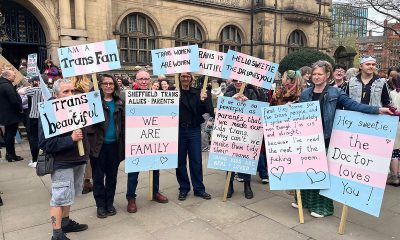World
US urges Central America governments to protect LGBTQ rights
Effort part of strategy to address migration ‘root causes’
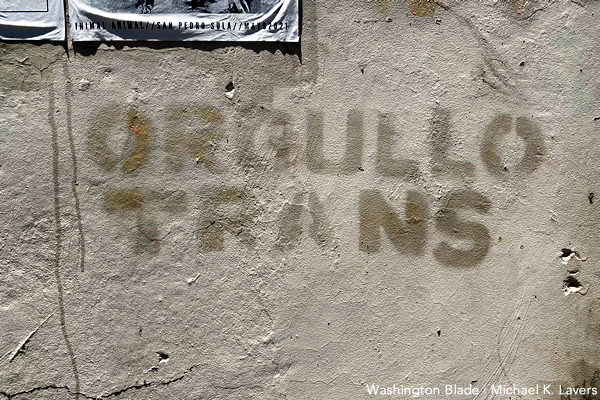
Editor’s note: International News Editor Michael K. Lavers was on assignment for the Washington Blade in El Salvador, Honduras and Mexico from July 11-25.
A State Department spokesperson says the U.S. will continue to urge the governments of Guatemala, El Salvador and Honduras to protect LGBTQ rights as part of its efforts to address the “root causes” of migration from the three countries.
“Human rights, including those of LGBTQI+ persons, is one of the central pillars of our engagement with leaders from Guatemala, Honduras and El Salvador,” said the spokesperson in response to a series of written questions from the Washington Blade.
“The United States raises concerns about violence, discrimination, abuse, harassment and stigma targeting LGBTQI+ (people) across northern Central America with various stakeholders,” added the spokesperson. “We work to engage on these issues across multilateral fora, such as the United Nations, the Equal Rights Coalition and the Organization of American States.”
Guatemala, El Salvador and Honduras form what is known as Central America’s Northern Triangle.
Vice President Kamala Harris, who met with Guatemalan President Alejandro Giammattei last month during her trip to Guatemala City, has said on numerous occasions that violence based on sexual orientation and gender identity is one of the factors behind migration from the region. Harris and other administration officials have also told migrants not to travel to the U.S.-Mexico border because it remains closed to them due to the pandemic.
LGBTQ Hondurans with whom the Blade recently spoke acknowledged violence has forced them to flee their homes.
Leonela Barralaga and Jerlín Martel are a same-sex couple who are raising an 11-year-old daughter in La Ceiba, Honduras.
They told the Blade on July 20 during an interview at the offices of Organización Pro Unión Ceibeña, a local human rights group, that they have fled Honduras twice. Barralaga and Martel said they returned to the country once because they did not want their daughter to further endure the squalid conditions in which they were living in Tapachula, Mexico, a city in the country’s Chiapas state that borders Guatemala.
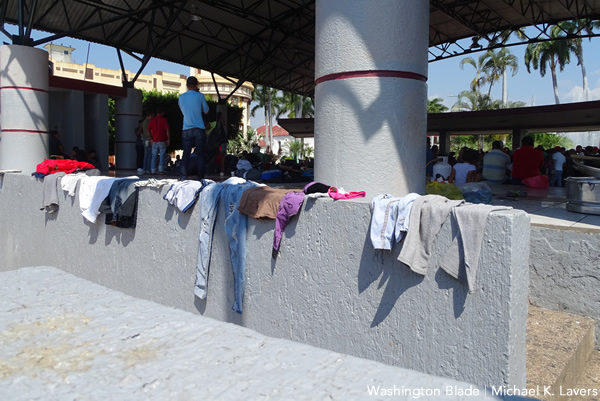
Marvin, a gay man from Honduras who plans to ask for asylum in the U.S., currently lives at Jardín de las Mariposas, a shelter for LGBTQ asylum seekers in the Mexican border city of Tijuana.
Marvin during a July 12 interview with the Blade at Jardín de las Mariposas spoke about his brother, who was murdered earlier this year in Honduras. Marvin was sobbing when Jaime Marín, who runs the shelter with his mother, Yolanda Rocha, showed this reporter a picture of his brother’s mutilated body in the morgue in San Pedro Sula, Honduras’ second-largest city.
A court in the Salvadoran capital of San Salvador last August sentenced three police officers to 20 years in prison for the 2017 murder of Camila Díaz Córdova, a trans woman who the U.S. deported. The Inter-American Court of Human Rights last month found Honduras responsible for the murder of Vicky Hernández, a trans woman who was killed hours after the 2009 coup that ousted then-President Manuel Zelaya.
Alexa, a trans woman who receives services at Organización Pro Unión Ceibeña, told the Blade during an emotional interview that she was raped in prison while serving a sentence for a stabbing she claims was an act of self-defense. Alexa also said guards forcibly cut her hair.
The Blade the day before witnessed a man stop his car on a street in San Pedro Sula, which is about three hours west of La Ceiba, and solicit for sex work two trans women with Colectivo Unidad Color Rosa, a local LGBTQ rights group. The U.S. granted asylum to Claudia Spellman, a trans woman who co-founded Colectivo Unidad Color Rosa, after death threats forced her to flee Honduras.
“The United States is committed to fighting for the human rights of LGBTQI+ persons at home and abroad,” the State Department spokesperson told the Blade. “LGBTQI+ persons are among the most vulnerable to forced displacement in and from El Salvador, Guatemala and Honduras.”
“Promoting and advancing these human rights is a foreign policy priority,” added the spokesperson. “As such, we endeavor to combat the violence and abuse, criminalization, discrimination and stigma targeting LGBTQI+ persons around the world, including in these three countries.”
Two members of Guatemalan civil society who work with LGBTQ people and people with HIV/AIDS — Visibles Executive Director Daniel Villatoro and Ingrid Gamboa of the Association of Garifuna Women Living with HIV/AIDS — are among those who participated in a round table with Harris in Guatemala City.
Samantha Power, administrator of the U.S. Agency for International Development, and U.S. Ambassador to Guatemala William Popp on June 17 visited the Guatemala City headquarters of Organización Trans Reina de las Noche, a trans advocacy group. The visit took place less than a week after Andrea González, the organization’s executive director who previously participated in the State Department’s International Visitors Leadership Program, was murdered near her Guatemala City home.
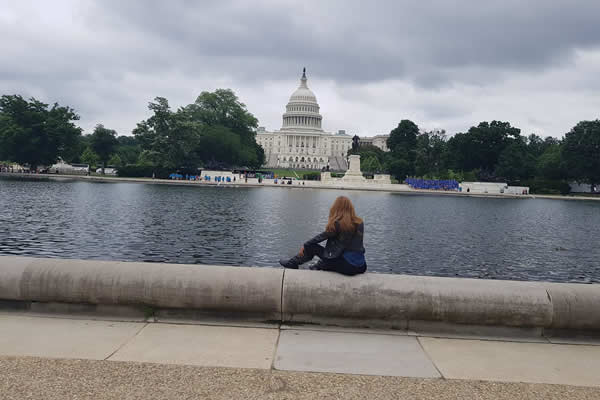
Sasha Rodríguez, a trans woman who works for Organización Pro Unión Ceibeña, is also an IVLP alum.
Bianka Rodríguez, executive director of COMCAVIS TRANS, a trans Salvadoran rights group, is among those who participated in what a USAID spokesperson described to the Blade as a “youth leaders lunch roundtable that we organized” with Power in San Salvador last month. The USAID spokesperson noted “they exchanged important points of view regarding USAID support (past and present) and the challenges of the LGBTIQ+ community in the country.”
“USAID human rights projects based in El Salvador support anti-discrimination efforts against the LGBTQI+ community,” said the State Department spokesperson. “They also support a regional effort that engages private sector companies in inclusive strategies to open labor opportunities for the LGBTQI+ community.”
“Projects also do research on hate crimes against the LGTBQI+ community and provides to the justice sector to investigate such crimes,” they added. “The majority of activities are led by local or regional LGBTQI+ groups.”
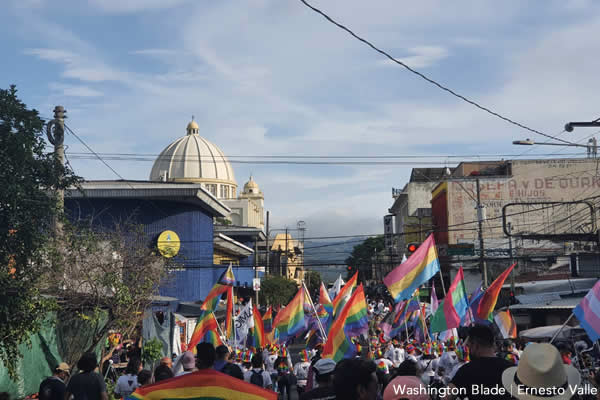
The State Department spokesperson noted “discussions between civil society leaders” and the U.S. Embassy in Honduras, “as well as USAID-led forums on LGBTQI+ migration push factors, help us learn more about the root causes and ways we can better support this community.” They also pointed out that USAID’s Unidos por la Justicia project “has supported the LGBTQI+ community to develop an anti-discrimination law and the law of gender identity” in the country.
USAID and Unidos por la Justicia in 2019 officially recognized Unidad Colectivo Color Rosa for its work. The Blade on July 19 saw a plaque with the two organizations’ logos on it hanging inside their San Pedro Sula office.
“USAID in Honduras has done extensive work with the LGBTQI+ population who lack access to formal education and workforce development services by supporting training that included self-esteem and human rights to prevent stigma and discrimination, and promote respect for diversity,” said the State Department spokesperson. “Through private sector engagement, businesses have agreed to interview members of the LGBTQI+ community, which is the foundation to valuing diversity in the workplace.”
USAID also works with Asociación PASMO, an organization that conducts HIV testing in San Pedro Sula.
The State Department spokesperson told the Blade that Honduran LGBTQ activists have attended workshops that focused on their participation in the country’s political process. They said USAID for the project’s next phase “will work with local higher education institutions to certify community members to participate as candidates in elections.”
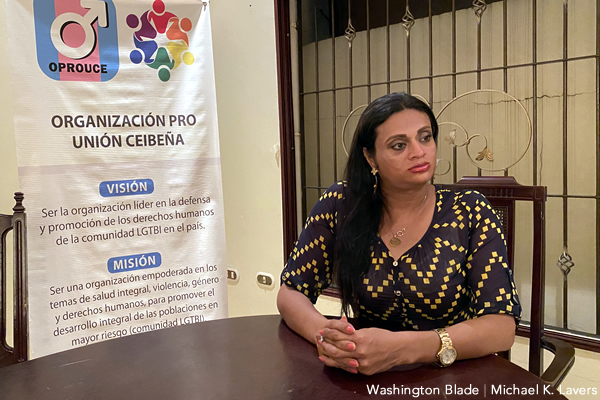
Honduras’ national elections are scheduled to take place on Nov. 28.
A federal judge in New York in March sentenced Honduran President Juan Orlando Hernández’s brother, former Honduran Congressman Juan Antonio “Tony” Hernández, to life in prison after a jury convicted him of trafficking tons of cocaine into the U.S.
The Biden administration on July 20 banned former Honduran President Porfirio “Pepe” Lobo Sosa, his wife and their children from traveling to the U.S. because of “their involvement in significant corruption.” Salvadoran prosecutors last week charged former President Salvador Sánchez Cerén and nine other members of former President Mauricio Funes’ administration with the misuse of more than $300 million in government funds.
Juan Francisco Sandoval, a leading anti-corruption prosecutor in Guatemala, fled to El Salvador on July 24 after Guatemalan Attorney General Consuelo Porras fired him. The Biden administration this week announced it has stopped working with Porras’ office.
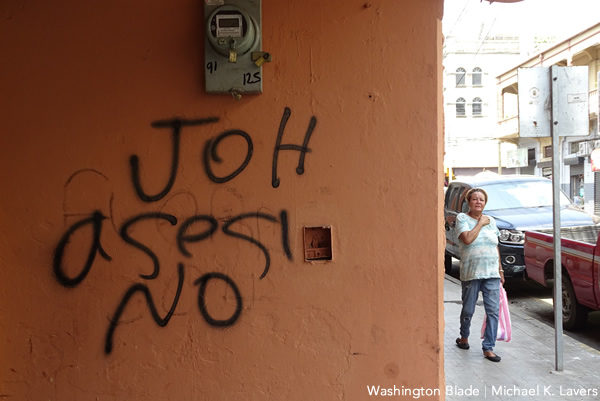
Corruption is one of the myriad issues that activists in the region have raised with the Blade. They also remain highly critical of their respective governments over the lack of LGBTQ rights.
“The United States is concerned with the protection governments extend to LGBTQI+ persons throughout the region,” said the State Department spokesperson. “While we have seen some positive developments; we will continue to raise the importance of protections for LGBTQI+ persons whenever appropriate, as well as the importance of holding accountable perpetrators of discrimination and violence.”
The State Department spokesperson also responded to the Blade’s question about what the Biden administration can do to ensure the Guatemalan, Honduran and Salvadoran governments adequately address anti-LGBTQ discrimination and violence in their respective countries.
“The U.S. government monitors and reports on the state of human rights across the world, including protections for the LGBTQI+ community,” said the State Department spokesperson. “Our efforts to draw attention to abuses of the human rights of LGBTQI+ persons create transparency and promote accountability for such abuses. The U.S. government also has sanctions and visa restriction authorities it can apply to perpetrators to promote accountability for human rights violations and abuses.”
Abdiel Echevarría-Caban and Dunia Orellana of Reportar sin Miedo contributed to this story.
Kenya
Kenya Red Cross-owned hotel to host anti-LGBTQ conference
Speakers from US, European countries to participate in May 12-17 gathering
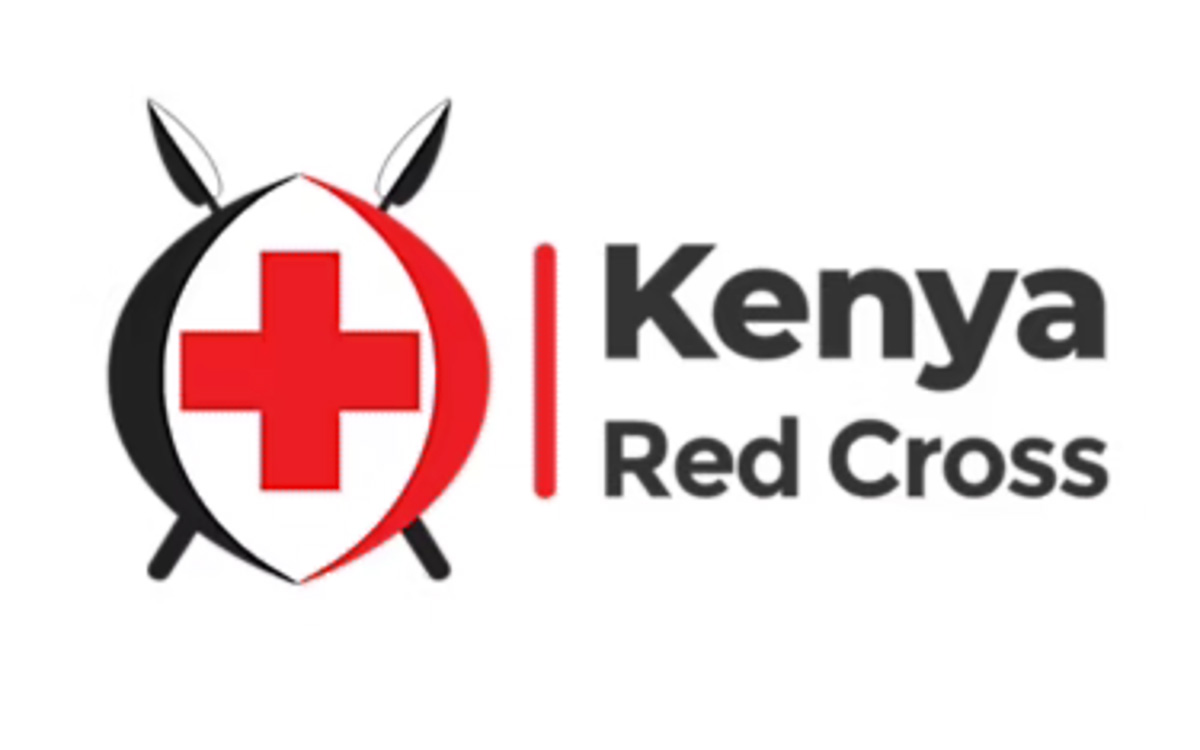
Plans to host a family values meeting next month in a 5-star hotel in Nairobi that the Kenya Red Cross Society co-owns have sparked an uproar among local queer rights groups.
The groups accuse the Kenya Red Cross of violating its Global Fund commitment of protecting key populations by allowing its Boma Hotel to host an “anti-gender and anti-LGBTQ” conference.
Influential guest speakers from the U.S., the Netherlands, Spain, and Poland will preside over the Pan-African Conference on Family Values that will take place from May 12-17. The Kenyan advocacy groups say these speakers’ organizations are globally recognized for undermining LGBTQ rights.
“As the principal recipient of Global Fund in Kenya, hosting this event contradicts (the) Red Cross’s humanitarian mission and threatens the safety and dignity of people living with HIV, women and LGBTQ+ individuals, the communities that Kenya Red Cross Society has long committed to supporting,” the queer rights groups state.
The LGBTQ groups that have criticized the Kenya Red Cross include Upinde Advocates for Inclusion, the Initiative for Equality and Non-Discrimination, and Gay and Lesbian Coalition of Kenya. They have also launched an online signature collection drive to compel the Kenya Red Cross to withdraw the hotel from hosting the “Promoting and Protecting Family Values in Challenging Times”-themed conference.
“The event’s so-called ‘family values’ narrative is a smokescreen for policies that push hateful legislation and promote death, discrimination, femicide, gender-based violence, and restrict fundamental freedoms across Africa,” the groups said.
The pro-life Western organizations that are scheduled to participate in the conference include Family Watch International from the U.S., CitizenGo from Spain, the Ordo Luris Institute from Poland, Christian Council International from the Netherlands, the New York-based Center for Family and Human Rights (C-FAM), and the Foundation for American Cultural Heritage. Their local counterparts include the National Council of Churches of Kenya, the Kenya Christian Professionals Forum, the Africa Christian Professionals Forum, and the Evangelical Alliance of Kenya.
C-FAM President Austin Ruse; Family Research Council Vice President for Policy and Government Affairs Travis Wever; Global Life Campaign Executive Director Thomas W. Jacobson; and the Rev. Ricky Chelette, executive director of Living Hope Ministries, Inc., and president of the Institute of Biblical Sexuality are among the U.S. guest speakers. Other participants include Henk Jan van Schthorst, president of Christian Council International’s board of directors, Ordo Luris Institute President Jerzy Kwasniewskie and his colleague, Rafal Dorosinski, director of the group’s Legal Analysis Center.
The Kenyan groups through their online petition — “Tell Red Cross Kenya Not to Give Hate a Platform” — has so far raised more than 1,000 of the 10,000 signatures they hope to collect. The petition is addressed to Red Cross Kenya Secretary-General Ahmed Idris and his predecessor, Abbas Gullet, who is the hotel’s director.
“We call on you to immediately cancel this booking and publicly reaffirm Red Cross’ commitment to human rights, health and inclusivity,” the petition reads. “Failure to act will raise concerns about whether (the) Red Cross can still be trusted by the community to lead with empathy and fight for their rights.”
The Kenya Red Cross, however, maintains the Boma Hotel is a separate entity, even though public records indicate it is one of the facility’s shareholders.
The LGBTQ groups note the hotel should be a safe space that promotes inclusion, not platforms that enable “harmful gathering” for hate and exclusion by “dangerous groups.”
“By providing a venue for this event, Red Cross directly enables a platform for hate and discrimination — a stark contradiction to the values of inclusivity, humanity, and nondiscrimination that the organization claims to uphold,” they said.
The organizations further warn that proceeding to host the conference threatens the relationship between the Red Cross and the marginalized communities who have long depended on the humanitarian organization for support and protection. CitizenGo has nonetheless criticized the LGBTQ groups, which it describes as “radical activist groups” for “trying to silence a pro-family event” and asked the Kenya Red Cross and the Boma Hotel not to back down.
“These groups are calling the event ‘hateful’ because it affirms the natural family — marriage between a man and a woman — and the dignity of every human life, including the unborn,” Ann Kioko, the group’s campaign director for Africa and the U.N., said.
Through an online counter signature collection drive, Kioko holds CitizenGo and other groups won’t be intimidated, silenced or apologize to the queer rights groups for defending “our families, our faith and our future”.
“The real goal of these foreign-funded activist groups is to impose LGBTQ and gender ideologies on Africa — ideologies that have led elsewhere to the confusion of children, the breakdown of family structures and the rise of sexual libertinism that results in abortion, STIs and lifelong emotional and psychological trauma,” Kioko stated.
India
Opposition from religious groups prompts Indian Pride group to cancel annual parade
Event was to have taken place in Amritsar on April 27

Pride Amritsar, a student-led organization in the Indian state of Punjab, earlier this month announced the cancellation of its Pride parade that was scheduled to take place on April 27, citing opposition from certain religious groups.
The event, planned for the Rose Garden in Amritsar, a city revered as a spiritual center of Sikhism, had faced mounting resistance from Sikh religious organizations, including the Nihang Singh faction and the Akal Takht, the faith’s highest temporal authority. These groups labeled the parade as “unnatural” and urged local authorities to deny permission, citing its potential to disrupt the city’s religious sanctity.
In an Instagram post on April 6, Pride Amritsar organizers Ridham Chadha and Ramit Seth elaborated on its mission and the reasons for the cancellation.
“Since 2019, we have organized peaceful parades and celebrations in Amritsar to connect and uplift the LGBTQIA+ community, with a particular focus on transgender individuals and their rights,” their statement read.
Chadha and Seth highlighted Pride Amritsar efforts in providing guidance, counseling, and job opportunities, which have been met with positive responses. However, due to opposition this year, Pride Amritsar announced the cancellation of the 2025 parade.
“We have no intention of harming the sentiments of any religious or political groups,” the statement read. “The safety of our members is our top priority, and we will take all necessary measures to ensure their protection.”
Chadha and Seth spoke with the Washington Blade about their decision to cancel the parade.
They explained that resistance came from both religious and political groups who labeled the parade and its values as anti-Sikh and contrary to Punjabi and Indian cultural norms. Critics specifically objected to the event’s location in Amritsar, a city regarded as a sacred center of Sikhism, arguing that the parade would disrupt its spiritual purity.
Chadha and Seth stressed Pride Amritsar lacks political, financial, or legal support. Composed of students and young professionals, the group organizes the parade biennially, dedicating personal time to advocate for the LGBTQ community.
“We do it independently, crowdfund the parade and cover the rest with our pockets,” said Seth and Chadha.
When asked by the Blade why Pride Amritsar did not approach the High Court or local authorities to protect the parade, despite the Supreme Court’s 2018 ruling that decriminalized consensual same-sex sexual relations, Chadha and Seth cited significant barriers.
“Pursuing legal action in India requires substantial resources, both financial and temporal,” they explained.
Chadha and Seth also noted that such action could lead to public shaming and unwanted publicity for participants, potentially harming their careers in Amritsar. They therefore chose not to pursue legal recourse.
Chadha and Seth said Pride Amritsar does not have any plans to hold alternative events.
“We are still exploring options, but we are likely not holding any events this year,” they said, citing significant harassment that organizers faced and the need for time to plan how to best serve the local LGBTQ community moving forward.
“Our evaluation of what the biggest challenge is has changed after this year,” said Chadha and Seth to the Washington Blade. “The biggest challenge, by far, seems to be education. We need to educate the community about what the community is, does, and why it exists. Why we do parades. Why we dance. Why calling someone ‘chakka’ is harmful. How we actually fit into religion and fall within the guidelines.”
Chadha and Seth said organizing the parade in Amritsar since 2019 has been an uplifting experience, despite continued opposition.
“The moment you join the parade, chant a slogan, or sing a song, it’s transformative,” they said. “Fear vanishes, and a sense of freedom takes over.”
The cancellation of the 2025 Amritsar Pride Parade has sparked concerns among activists in Punjab, as the Indian Express reported.
The Punjab LGBT Alliance and other groups expressed concern that the decision to cancel the parade may strengthen opposition to future LGBTQ-specific events.
Australia
Australian LGBTQ rights group issues US travel advisory
Equality Australia warns transgender, nonbinary people of ‘serious risks’

An LGBTQ rights group in Australia has issued a travel advisory for transgender and nonbinary people who plan to visit the U.S.
Equality Australia on April 14 posted the advisory to its website that states the U.S. government’s policy on visas and Electronic System for Travel Authorization or ESTA “appears to be” the following:
• To use the term “biological sex”
• To only use the gender marker recorded at a person’s birth, even if this differs from their gender
• That valid foreign passports with an ‘X’ gender marker and a valid visa (if needed) may continue to be admitted, however this is contingent upon satisfying inspection of their admissibility by the U.S. Customs and Border Protection officer at the port of entry
• That any previously issued, valid visa may remain current until its expiration date and the visa holder does not need to apply for a new visa with an amended gender marker until the current visa expires (it is unclear whether this applies to ESTAs)
• That new visas will only be issued under the gender marker recorded for the applicant at birth (it is unclear whether this applies to ESTA applications, although only ‘M’ and ‘F’ gender marker options are available for ESTA applications)
• That if consular officers assessing visa applications become aware an application does not contain the gender marker recorded at the applicant’s birth, they should assess additional evidence (such as previous travel records, although the scope is unclear), and/or conduct interviews and
• That where individuals are not using the gender marker recorded at their birth, consular officers should consider classifying the application as procuring a visa through material misrepresentation or fraud, which results in a lifetime bar from the U.S.
President Donald Trump shortly after he took office on Jan. 20 issued an executive order that bans the State Department from issuing passports with “X” gender markers. Secretary of State Marco Rubio in response to directive ordered State Department personnel to “suspend any application requesting an ‘X’ sex marker and do not take any further action pending additional guidance from the department.” A federal judge in Boston on April 18 issued a temporary injunction against the Trump-Vance administration’s directive.
Equality Australia says its advisory is “relevant if you are traveling to the U.S.” and fall under the following criteria:
• Hold a passport with a gender ‘X’ marker
• Have identity documents with gender markers different to those assigned to you at birth, or where other relevant details (such as your name) have been changed
• Have gender markers in your identity documents that do not match your gender expression
• Have a track record of LGBTIQ+ activism or other political activity.
“Travel to the U.S. carries serious risks that should be considered before planning any travel, particularly if you fall under one of the above categories,” reads the advisory.
Germany, Denmark, Finland, and the Netherlands are among the countries that have issued travel advisories for trans and nonbinary people who plan to visit the U.S.
WorldPride is scheduled to take place in D.C. from May 17-June 8.
InterPride, the organization that coordinates WorldPride events, on March 12 issued its own travel advisory for trans and nonbinary people who want to travel to the U.S. Egale Canada, one of Canada’s largest LGBTQ advocacy organizations, in February announced its members will not attend WorldPride and any other event in the U.S. because of the Trump-Vance administration’s policies.
-

 Federal Government2 days ago
Federal Government2 days agoHHS to retire 988 crisis lifeline for LGBTQ youth
-

 Opinions2 days ago
Opinions2 days agoDavid Hogg’s arrogant, self-indulgent stunt
-

 District of Columbia2 days ago
District of Columbia2 days agoD.C. police seek help in identifying suspect in anti-gay threats case
-

 Opinions2 days ago
Opinions2 days agoOn Pope Francis, Opus Dei and ongoing religious intolerance

